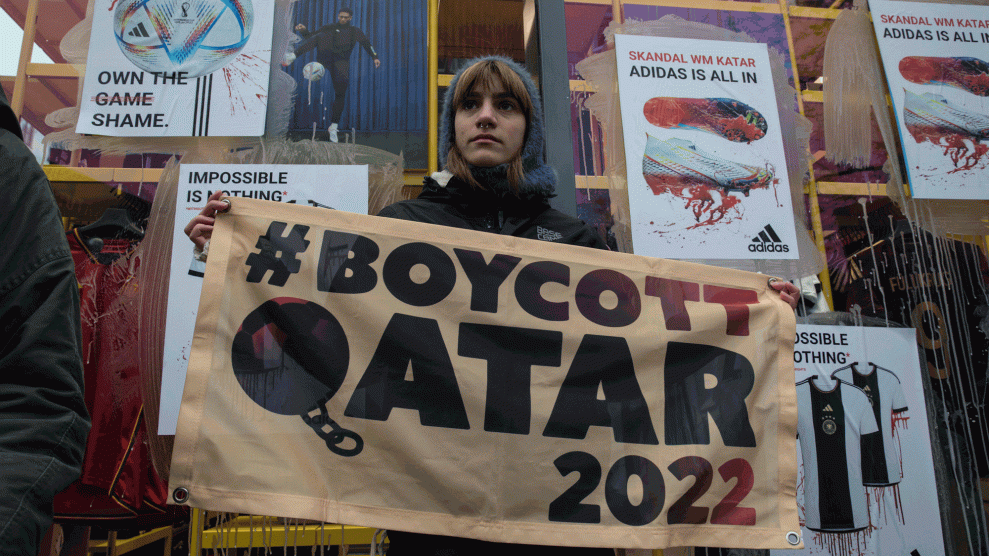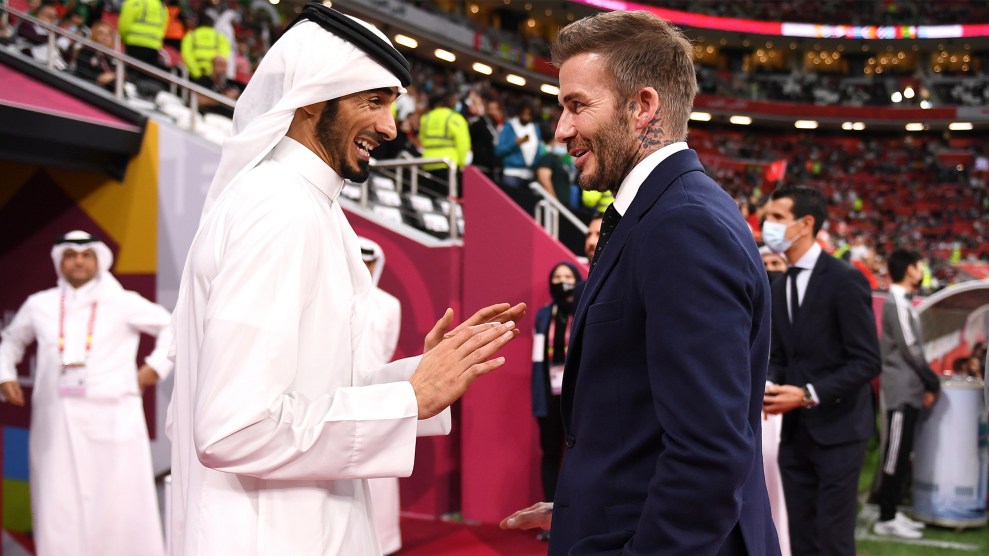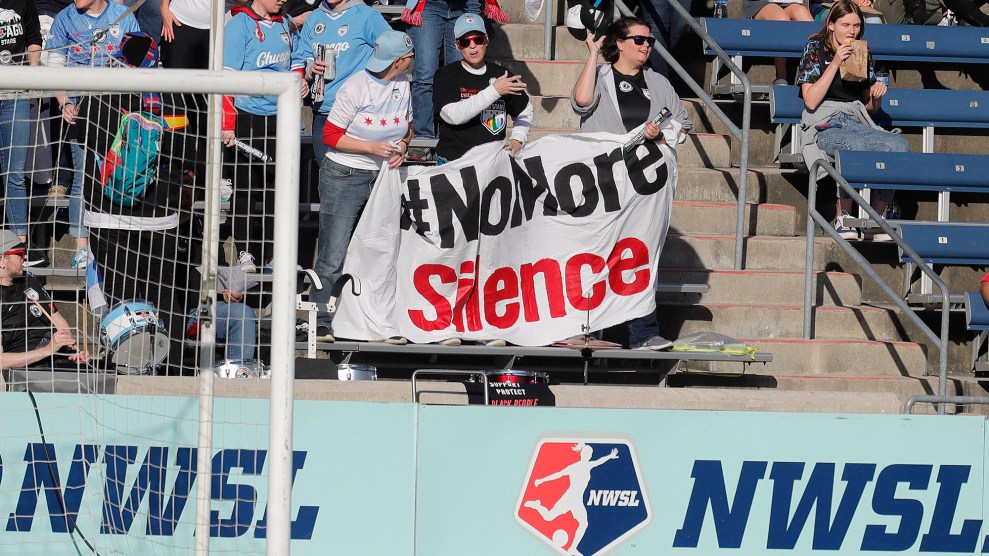
Activists gathered in Berlin on November 19, 2022, to draw attention to human rights violations in Qatar. Michael Kuenne/AP
The first glimpse I got of what it will be like to watch this year’s men’s World Cup came during the 2021 sci-fi thriller The Tomorrow War, in which Chris Pratt plays a Green Beret-turned-teacher who has to save the human race from extinction. In the opening minutes of the film, Pratt is at a Christmas party on a quiet American suburban block, where everyone is gathered to watch the World Cup final in Doha. Brazil is playing France, or maybe it’s Argentina—Reddit isn’t entirely sure either. The Seleção have got a breakaway. And then a portal opens up in front of the goal and a bunch of people from the future tell the biggest television audience on the planet that, in 30 years, aliens are going to kill them all.
Is this really happening? Chris Pratt’s character is thinking. Are we all going to die?
Is this really happening? I thought. A December World Cup? In fucking Qatar?
It is really happening. On Sunday, the host nation will take on Ecuador, and formally kick off a World Cup with all the charm and good vibes of product placement in a straight-to-streaming action movie. No one really asked for it, but it’s here: a decadent, chaotic, and grotesque spectacle that’s become a symbol not just of the transformation of an entire sport but of an entire economic and political system.
The Guardian recently published a “Where are they now?” of the people who were in the room in Switzerland in 2010 when Russia and Qatar were awarded the 2018 and 2022 World Cups, respectively, and it reads like the postscript of a mob movie: Seven have since been banned for life from soccer; one has been banned from the Olympics; nine were banned from the sport for shorter periods of time (a few of those bans were later overturned); and one of them, of course, recently invaded Ukraine. David Beckham was there, too, but we’ll get to him in a bit. Although Russia and Qatar have long denied any wrongdoing, the Department of Justice alleged last year that both countries bribed international soccer officials to win their bids. The controversy over the Qatar World Cup began with the bid itself, and extended eventually to virtually everything else about the tournament.
In the years since the World Cup was awarded, Qatar has faced scrutiny from journalists and human rights advocates over its criminalization of homosexuality and the living and working conditions of migrant workers who have built the infrastructure for the tournament. The size of Qatar’s investment is staggering. As I wrote in a recent cover story for our November/December issue, Qatar has spent $200 billion to prepare for this showcase event, building stadiums, subways, roads, and whole communities from scratch. (Not all of it was finished in time.) To accommodate a tournament in a country where summer temperatures can reach 110 degrees, FIFA moved the World Cup from its traditional early summer start to what is normally the middle of the European club season. The entire soccer calendar has been reconfigured and condensed this year and, unsurprisingly, everyone is injured.
Qatar’s growth was powered by a deeply exploitative system of migrant labor used throughout the Gulf known as kafala. Workers could be deported if they left their jobs, and employers often confiscated their passports. Qatar officially ended kafala last year and has made incremental reforms over the last decade, but according to human rights groups, many of the underlying issues persist. According to one analysis, 6,500 migrant laborers have died in the country since FIFA awarded the tournament to Qatar. The country has long downplayed the death toll, arguing that only those fatalities that occurred on the clock at stadium sites should really be counted. The “mortality rate among these communities is within the expected range for the size and demographics of the population,” it said last year. When Qatar hired the law firm DLA Piper to conduct its own investigation in 2014, it found that at one point migrant workers were dying in the country at a rate of about one per day.
Because of Qatar’s human rights record, the World Cup has ushered in years of debate about “sportswashing.” The term has become a catch-all for the ways autocratic regimes use athletics to project an alternative image—and the willingness of corporations, fans, and other nations to go along with it. Broadcasters marveling over futuristic Doha without talking about who built it? Sportswashing. (Fox, which owns the English-language broadcast rights in the US and received comped travel to Doha from Qatar Airways, has already said it will not cover human rights at the event.) Qatar’s boast that it will be “the first carbon-neutral World Cup”? Sportswashing and greenwashing. But the term sometimes reverses the sequence of things—after all, it was only after Qatar won its bid that casual sports fans became aware of its human rights record. Sportswashing is just one facet of a larger soft-power play.
In the coming weeks you’ll hear a lot about how a country the size of Connecticut ended up hosting the tournament. In a roundabout way it’s a question that answers itself: The thing about being a country the size of Connecticut is that you are a country the size of Connecticut. In other words, vulnerable. Soccer offers a kind of influence and legitimacy on the global stage that Qatar, a small Middle Eastern country that recently endured a lengthy economic blockade by its neighbors, needs and will go to great lengths to keep. “What this World Cup is really about is security,” argued The Guardian’s Barney Ronay last month. Pariah states don’t host World Cups. (Russia might be at war, but it still has friends at FIFA—and in Qatar.)
Qatar has converted its petroleum wealth into a strategic reserve of soccer. It’s one of the most powerful institutions in the game. Qatar’s sovereign wealth fund owns the French club Paris-St. Germain, which employs perhaps the world’s best player at the moment (Kylian Mbappe of France) and the best player of all time (Lionel Messi of Argentina—at 35 years old, the sentimental pick to lift the cup). A state-financed Qatari television network, beIN Sports, owns the broadcast rights to some of the world’s top leagues. The head of that network—who is also in charge of PSG—sits on the executive committee of Europe’s soccer governing body. State-owned Qatar Airways has subsidized some of the biggest clubs in the world through lucrative sponsorship deals. Qatar can’t be excluded from the world of international soccer, for the simple reason that it is international soccer.
The result of all of this has been a deeply strange spectacle—and the only reason it doesn’t feel even stranger is that sports fans have grown accustomed to marquee events being held in petro-states. Qatar has previously hosted the Italian Super Cup and the Club World Cup; Saudi Arabia hosted Formula 1 racing and boxing events. The United Arab Emirates recently landed NBA preseason games. All three countries own outright or are closely associated with powerhouse European club teams. The last World Cup was in Russia. The next World Cup final will be in Texas.
The general aesthetic of the lodging for fans, beyond the five-star hotels, is of a “disappointing but what did you expect?” AirBnB. There aren’t a lot of places to get a drink. There is a giant fire-breathing spider on loan from Glastonbury. A faint whiff of Fyre Fest permeates the sometimes breathless coverage, but Billy McFarland didn’t have a security state. Qatar is requiring visitors to download a tracking app, and restricting what you can do while you’re there. Last year, three Norwegian journalists were arrested in Qatar while reporting on labor conditions. Earlier this week, a Danish television crew was harassed by authorities in Doha.
By normal standards, this World Cup will be a magnet for protests. French cities are boycotting the outdoor watch parties and fan festivals that traditionally accompany the tournament. The Danish team, whose colors are red and white, will have special black jerseys in recognition of migrant worker deaths. The English captain, like those of several other squads, will wear a rainbow “anti-discrimination” armband. The US team—which wrote a letter to Congress advocating for tighter gun control laws earlier this year—will display a rainbow version of its crest at its facilities, but stick to the regular one at games. Most significantly, a number of countries have expressed support for a campaign by human rights advocates to use World Cup revenues to set up a compensation fund for migrant workers and their families.
To suggest that the tournament is being played under a cloud of protest, though, would be to miss the many larger ways it is not. In September, the French Football Federation “deplored” what it called a “campaign of stigmatization” against Qatar, while affirming its support for “human rights and other essential causes.” The federation hailed the World Cup as a positive influence on the Gulf state—one that had brought “undeniable” progress.
This is the party line—to deflect and defend. FIFA recently barred the Danish team from wearing T-shirts that say “Human Rights for All” because it’s a political message, even though “human rights” is one of the organization’s stated values. In November, FIFA President Gianni Infantino sent a letter to all 32 federations that are participating, urging them to “focus on the football” and “not allow football to be dragged into every ideological or political battle that exists.” On Saturday, the day before the tournament started, he told reporters he’d be open to holding a World Cup in Iran.
Qatar, which is paying David Beckham $200 million to be a brand ambassador for the country and flying fans in from the Netherlands to post favorable things on social media, has accused its critics of racism, and of hijacking the extremely normal and apolitical winter World Cup for their own ends. “Turning it into a platform of political statements, I don’t think is right for the sport,” Nasser el-Khater, the head of the country’s World Cup organizing committee, told Sky News in October, not long before one of Qatar’s World Cup “ambassadors” condemned homosexuality in an interview with a German media outlet.
People who want the World Cup to set up a compensation fund for workers are “just reading off a piece of paper,” el-Khater said. In other words, it was all just virtue-signaling.
Qatar’s capture of the international soccer apparatus isn’t just about Qatar. It’s a model for similarly minded regimes. In my story for the magazine about the sport’s big-money evolution, I led with the antics of long-suffering Newcastle United fans, who took to the streets dressed as sheikhs when their team was sold to Saudi Arabia. (Excuse me—to a consortium led by the Public Investment Fund of Saudi Arabia, which has given “legally binding” but unspecified assurances that the Saudi state will not control the club, even though Mohammed bin Salman himself personally texted Boris Johnson to help clinch the deal, which was reportedly brokered on MBS’s yacht.) It was a grim affair, I wrote then—a glimpse of what so many people were willing to lose in order to win.
The Saudi ruler, who has a close relationship with the president of FIFA, is already preparing to bid for the next tournament that’s up for grabs, in 2030. And would you really bet against him?
In some ways, this World Cup has served a vital function. The scandal made it impossible to ignore what the event and FIFA are really about, by putting under the microscope every part of the sordid system—the bureaucracy, the sponsorships, the infrastructure, the marketplace. In much the same way that Trump laid bare the hollowness of existing American institutions and norms, Qatar’s bid, like Russia’s before it and Saudi Arabia’s down the road, should dispel whatever illusions one might have about the processes and purpose of international sports—it is always about power and money. The country’s complaints about the criticism it has received from the Western press ring hollow on a moral level, but there is a certain logic to this defense, in a Bond villain kind of way; they could only buy what was already for sale.
Soccer fandom, like so much of modern life, is a constant struggle to figure out where you have leverage and responsibility, and where you must simply Participate In Society. Some pressure points are clearer than others. You can demand more of your national federations, for instance—human rights organizations are pushing FIFA to allot $440 million (an amount equivalent to the total World Cup prize money) for a compensation fund for migrant workers. You can demand they stop abusing women, too.
For all the sport’s corruption and moral compromise, I’m encouraged by the people who have found space for both passion and principle amid soccer’s Gilded Age. Last weekend, a group of Newcastle supporters, calling themselves “NUFC Fans Against Sportswashing,” gathered outside their stadium in a silent protest of the club’s ownership. There weren’t very many of them, but it matters that they showed up—because a sport’s structures aren’t the same as its soul. This is the tension inherent to sports as a commodity: It has always belonged to you, but it does not belong to you.
Which is just a long way of saying that in spite of everything, I am still going to watch. Of course I am. I’ve waited eight years to watch the US men play again at this level, and it’s a young, diverse, and generally fun group of guys you can be proud to get behind.
And then, perhaps, we can start talking about the country that’s hosting the World Cup Final in 2026.












